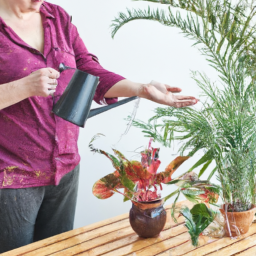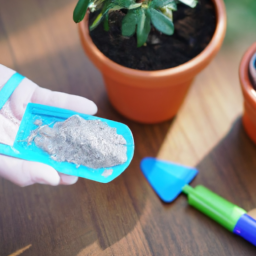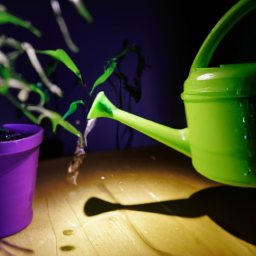
Have you ever found yourself wondering, “Can I water indoor plants at night?” It’s a common question among plant enthusiasts who want to ensure their green friends are well taken care of. Some say watering at night can be harmful, while others believe it’s perfectly fine. In this blog post, we’ll explore the pros and cons of watering indoor plants at night to help you make an informed decision for your plant care routine. So grab a cup of tea, sit back, and let’s dive into the world of nighttime plant watering.
Benefits and Risks of Watering Indoor Plants at Night
When it comes to watering indoor plants, there is often a debate about whether it is okay to water them at night. Some people believe that watering plants at night can be beneficial, while others think it can be harmful. In this article, we will explore the benefits and risks of watering indoor plants at night.
Benefits of Watering Indoor Plants at Night
One of the main benefits of watering indoor plants at night is that it can help the plants absorb more water. During the day, plants are focused on photosynthesis and transpiration, so they may not be able to take in as much water. By watering them at night, when they are not as active, they can better absorb the water and nutrients you provide.
Additionally, watering at night can help prevent evaporation. If you water your plants during the day, the hot sun can cause the water to evaporate quickly, leaving your plants thirsty. By watering at night, you can ensure that the water has time to soak into the soil and reach the roots of your plants.
Another benefit of watering indoor plants at night is that it can help regulate the temperature of the soil. During the day, the soil can become quite hot, which can stress out your plants. By watering at night, you can cool down the soil and create a more comfortable environment for your plants to thrive.
Risks of Watering Indoor Plants at Night
While there are benefits to watering indoor plants at night, there are also some risks to consider. One of the main risks is that watering at night can create a damp environment, which can attract pests and promote fungal growth. If you are not careful with your watering habits, you may end up causing more harm than good to your plants.
Another risk of watering indoor plants at night is that it can lead to root rot. If the soil does not have enough time to dry out before the next watering, the roots of your plants can become waterlogged and start to rot. This can ultimately lead to the death of your plants if not addressed promptly.
Additionally, watering at night can increase the risk of overwatering your plants. It can be harder to gauge how much water your plants actually need when watering in the dark, which can result in waterlogged soil and stressed plants. It is important to be mindful of how much water you are giving your plants to avoid this issue.
In conclusion, while there are benefits to watering indoor plants at night, such as improved water absorption and prevention of evaporation, there are also risks to consider, including pest attraction, fungal growth, root rot, and overwatering. It is important to carefully monitor your watering habits and adjust them as needed to ensure the health and vitality of your indoor plants.
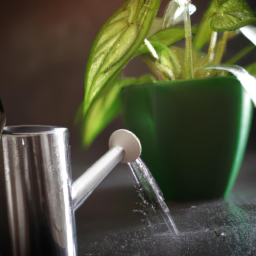
Best Practices for Watering Indoor Plants: Day vs. Night
Introduction
When it comes to watering indoor plants, one of the most common questions that plant owners have is whether it is okay to water their plants at night. Some people believe that watering at night can lead to root rot and other issues, while others argue that it is perfectly fine. In this article, we will explore the pros and cons of watering indoor plants at night and provide you with the best practices to ensure your plants thrive.
Pros of Watering Indoor Plants at Night
Watering your indoor plants at night can have several benefits. For starters, the cooler temperatures at night mean that less water will evaporate, allowing the plants to absorb more moisture. This can be particularly beneficial for plants that are prone to drying out quickly.
Additionally, watering at night can help to prevent water stress during the hottest part of the day. By providing your plants with a good drink in the evening, you can help them to better withstand the heat and sun exposure the following day.
Finally, some plants, such as orchids, prefer to be watered at night because they are more active during the evening hours. By watering them at night, you can better mimic their natural environment and promote healthy growth.
It is important to note that not all plants will benefit from being watered at night, so it is essential to consider the specific needs of each plant before deciding on a watering schedule.
Cons of Watering Indoor Plants at Night
While there are benefits to watering indoor plants at night, there are also some potential drawbacks to consider. One of the main concerns is the risk of root rot. When plants are watered at night, the excess moisture may not have a chance to evaporate before the temperatures drop, leading to soggy soil and root rot.
Another issue with watering at night is that it can create a damp environment that is ideal for fungal growth. Fungi thrive in moist conditions, so watering your plants at night could increase the risk of fungal diseases developing.
Finally, if you are using artificial lighting for your indoor plants, watering at night can disrupt their natural light cycle. Plants rely on a consistent light-dark cycle to regulate their growth and flowering, so watering them at night could interfere with this process.
Overall, while there are benefits to watering indoor plants at night, it is essential to weigh the pros and cons and consider the specific needs of your plants before deciding on a watering schedule.
Best Practices for Watering Indoor Plants
1. Consider the specific needs of each plant: Before deciding on a watering schedule, take the time to research the specific needs of each plant in your collection. Some plants prefer to be watered in the morning, while others may thrive with an evening watering.
2. Check the soil moisture: Before watering your plants, always check the soil moisture level. Stick your finger into the soil up to your knuckle to see if it feels dry. If the soil is still moist, hold off on watering until it dries out a bit more.
3. Water thoroughly but infrequently: When you do water your plants, make sure to water them thoroughly so that the roots receive an adequate amount of moisture. However, it is essential not to overwater, as this can lead to root rot and other issues.
4. Use room temperature water: When watering your plants, it is best to use room temperature water. Cold water can shock the roots, while hot water can scald them. Letting the water sit out for a few hours before using it can help to bring it to room temperature.
5. Consider the season: The watering needs of your plants may vary depending on the season. In the summer, plants may need more frequent watering due to the heat, while in the winter, they may require less water. Adjust your watering schedule accordingly.
By following these best practices and considering the specific needs of your plants, you can ensure that they receive the right amount of water at the right time, whether it be during the day or at night. Remember to monitor your plants regularly and adjust your watering schedule as needed to promote healthy growth and prevent issues such as root rot.
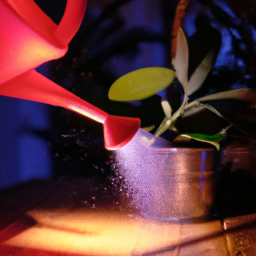
How Nighttime Watering Affects Indoor Plant Growth and Health
The Science Behind Nighttime Watering
When it comes to watering indoor plants at night, there are a few key factors to consider. One of the main concerns is how nighttime watering can affect the growth and health of your plants.
Plants go through a process called transpiration, where they release water vapor through their leaves. This process is crucial for the plant’s overall health and growth, as it helps to regulate temperature, transport nutrients, and maintain cell structure.
When you water your plants at night, you run the risk of creating a damp environment that can promote the growth of mold, mildew, and other harmful pathogens. This can lead to root rot, fungal diseases, and ultimately, the death of your plant.
Additionally, watering at night can also disrupt the plant’s natural circadian rhythm. Just like humans, plants have an internal clock that regulates their growth and development. By watering at night, you may be confusing the plant’s internal clock and causing stress to the plant.
In conclusion, while it may be tempting to water your indoor plants at night for convenience, it’s best to stick to watering during the day to ensure the health and growth of your plants.
Tips for Proper Watering
To ensure the health and growth of your indoor plants, it’s important to follow some basic watering tips.
First, make sure to water your plants thoroughly but allow the soil to dry out slightly between waterings. This will help prevent overwatering and root rot.
Second, water your plants in the morning or early afternoon to give them enough time to dry out before nightfall. This will help prevent the growth of mold and mildew.
Lastly, make sure to water the soil directly and avoid getting water on the leaves, as this can promote the growth of fungal diseases.
By following these tips, you can help ensure the health and growth of your indoor plants and avoid the pitfalls of nighttime watering.
Conclusion
In conclusion, while it may be tempting to water your indoor plants at night for convenience, it’s best to stick to watering during the day to ensure the health and growth of your plants. By following some basic watering tips and understanding the science behind nighttime watering, you can help your indoor plants thrive and flourish. Remember, a little care and attention to your plants’ watering needs can go a long way in ensuring their overall health and well-being.
In Summary
Many people wonder if it’s okay to water indoor plants at night. The short answer is yes, you can water your indoor plants at night, but there are a few things to keep in mind. First, make sure you’re not overwatering your plants, as this can lead to root rot and other issues. It’s best to water your plants when they actually need it, rather than sticking to a strict schedule.
Another thing to consider is the humidity levels in your home. If your indoor plants are in a particularly dry environment, watering them at night can help increase the humidity levels and keep them healthy. Just be sure not to water them too much, as this can also lead to problems. Ultimately, the best time to water your indoor plants is when they need it, regardless of the time of day. Just pay attention to their specific needs and adjust your watering schedule accordingly.
Curious Minds Asked, We Responded. Frequently Asked Questions:
Q1. Is it okay to water indoor plants at night?
A1. It is generally not recommended to water indoor plants at night. Watering at night can create a damp environment that may promote the growth of mold and mildew. It is best to water your indoor plants in the morning so that they have time to dry out during the day.
Q2. What is the best time to water indoor plants?
A2. The best time to water indoor plants is in the morning. This allows the plants to absorb the water they need throughout the day and ensures that any excess moisture has a chance to evaporate before nightfall.
Q3. Will watering indoor plants at night cause root rot?
A3. Watering indoor plants at night can increase the risk of root rot, especially if the plants are already prone to overwatering. It is important to allow the soil to dry out slightly between waterings to prevent root rot from occurring.
Q4. Can watering indoor plants at night attract pests?
A4. Yes, watering indoor plants at night can attract pests such as fungus gnats and other insects that thrive in moist environments. To prevent pest infestations, it is best to water your indoor plants in the morning and allow the soil to dry out before watering again.
Q5. How can I tell if my indoor plants need water at night?
A5. You can check if your indoor plants need water at night by sticking your finger into the soil. If the top inch of soil feels dry, it is time to water your plants. It is important to water your indoor plants only when they need it to prevent overwatering.

James Wong is a renowned ethnobotanist, plant scientist, and local television presenter. With a passion for demystifying plant science, he is known for translating complex botanical concepts into practical advice for everyday plant enthusiasts. James’s expertise spans from traditional gardening to cutting-edge plant technologies, making his insights accessible and informative.

